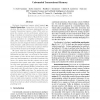Free Online Productivity Tools
i2Speak
i2Symbol
i2OCR
iTex2Img
iWeb2Print
iWeb2Shot
i2Type
iPdf2Split
iPdf2Merge
i2Bopomofo
i2Arabic
i2Style
i2Image
i2PDF
iLatex2Rtf
Sci2ools
154
click to vote
HPCA
2005
IEEE
2005
IEEE
Unbounded Transactional Memory
Hardware transactional memory should support unbounded transactions: transactions of arbitrary size and duration. We describe a hardware implementation of unbounded transactional memory, called UTM, which exploits the common case for performance without sacrificing correctness on transactions whose footprint can be nearly as large as virtual memory. We performed a cycleaccurate simulation of a simplified architecture, called LTM. LTM is based on UTM but is easier to implement, because it does not change the memory subsystem outside of the processor. LTM allows nearly unbounded transactions, whose footprint is limited only by physical memory size and whose duration by the length of a timeslice. We assess UTM and LTM through microbenchmarking and by automatically converting the SPECjvm98 Java benchmarks and the Linux 2.4.19 kernel to use transactions instead of locks. We use both cycle-accurate simulation and instrumentation to understand benchmark behavior. Our studies show that the co...
Computer Architecture | HPCA 2005 | Large Transactions | Unbounded Transactional Memory | Unbounded Transactions |
Related Content
| Added | 01 Dec 2009 |
| Updated | 01 Dec 2009 |
| Type | Conference |
| Year | 2005 |
| Where | HPCA |
| Authors | C. Scott Ananian, Krste Asanovic, Bradley C. Kuszmaul, Charles E. Leiserson, Sean Lie |
Comments (0)

